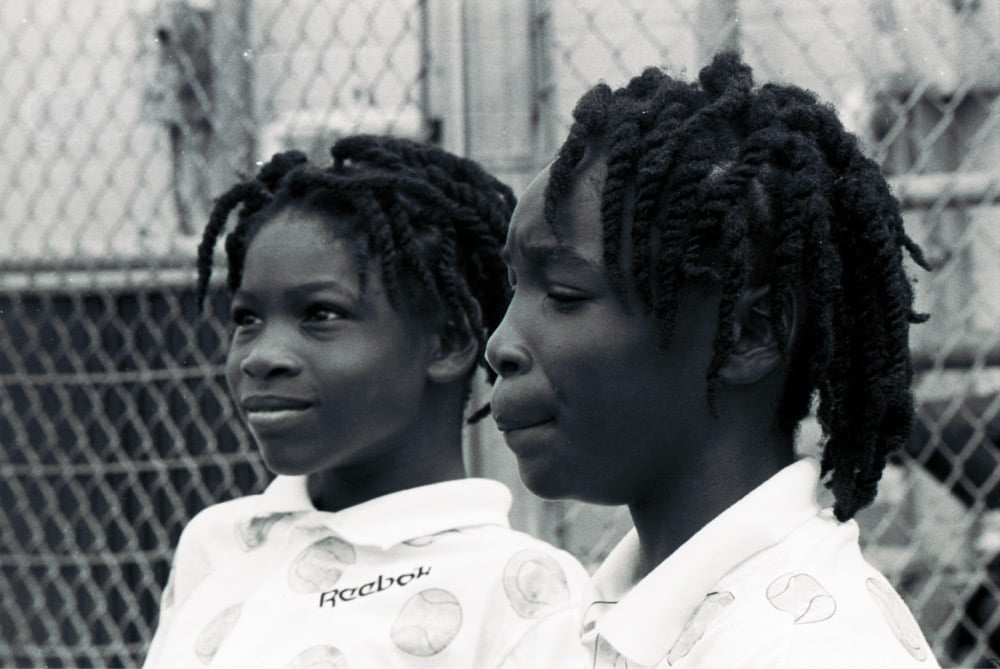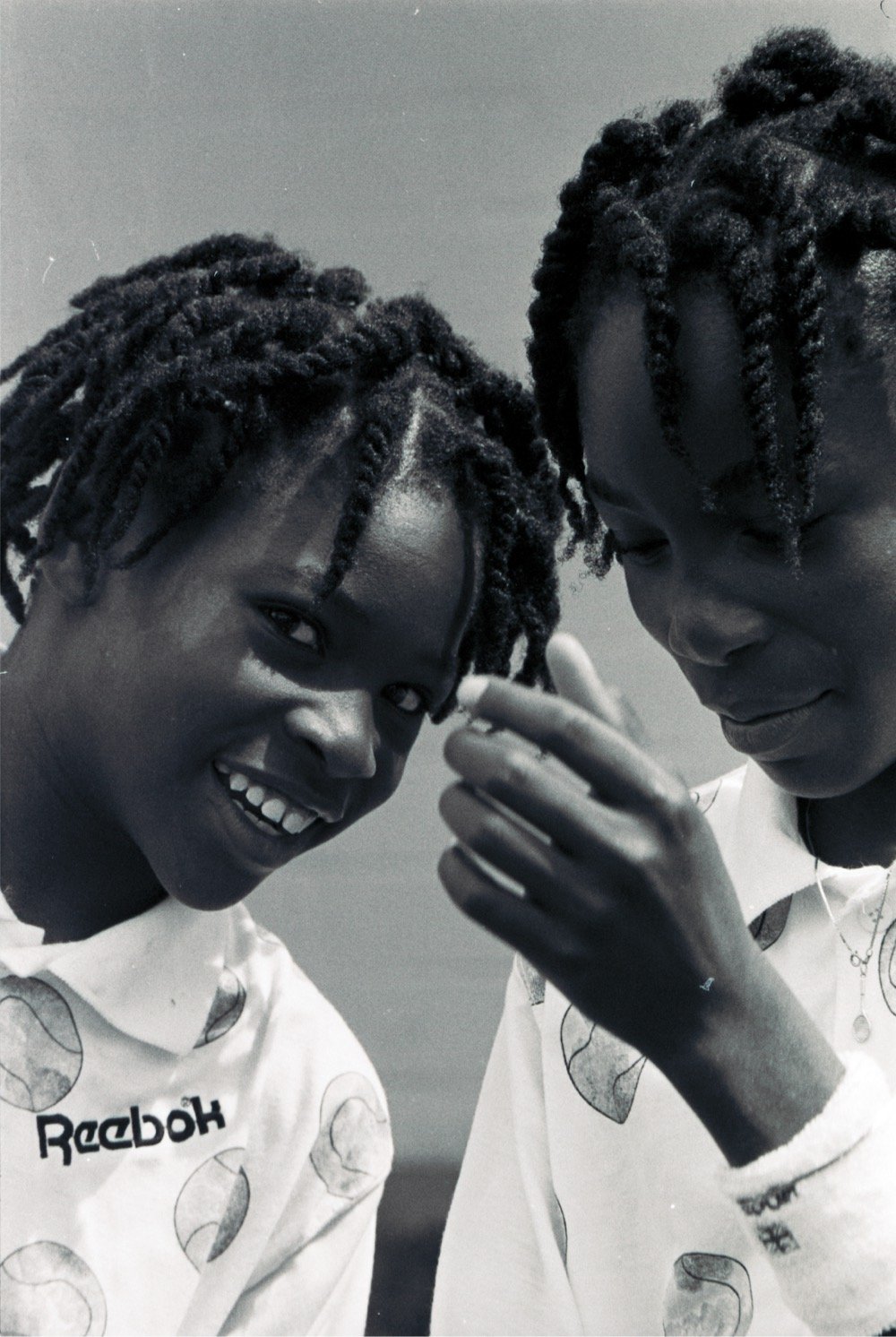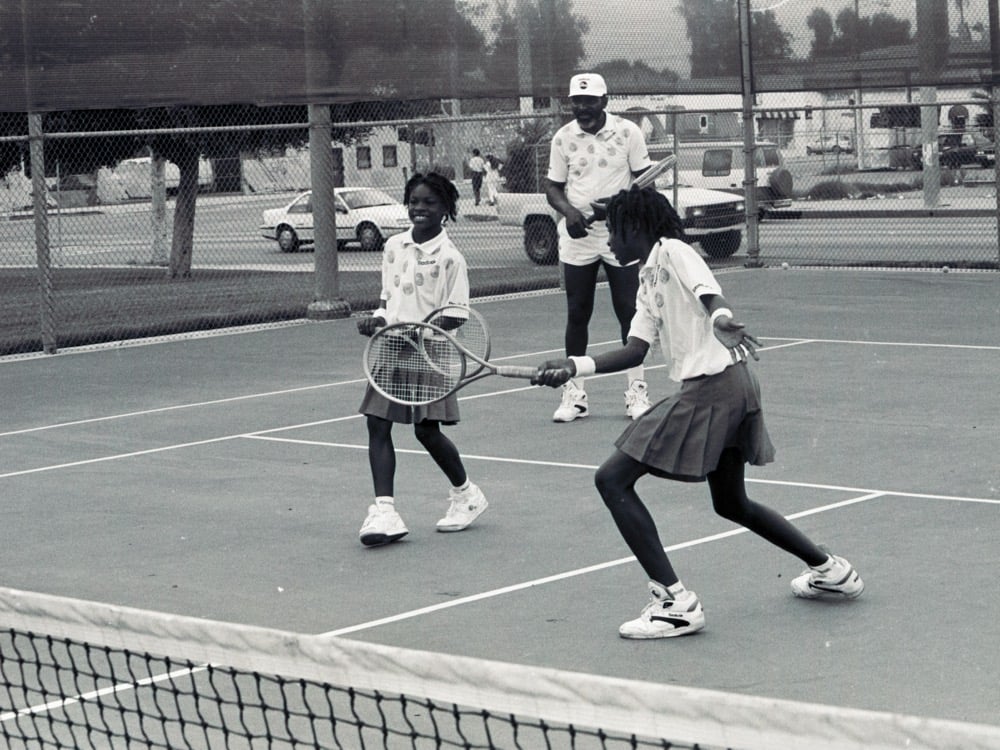


The Smithsonian’s National Museum of African American History and Culture is home to a collection of photographs taken by Rod Lyons in 1991 of Venus and Serena Williams practicing tennis at the ages of 12 and 10 on a tennis court near their home in Compton. Their father Richard is in the photos as well, coaching his daughters. Patrick Sauer talked to Lyons about the photos for Smithsonian Magazine:
“Where I was sent to shoot an up-and-coming tennis player was interesting because [the sport’s] ’70s [to] ’80s boom was over, so [tennis] wasn’t that popular overall, and you certainly didn’t see Black people in Compton out there playing. But other than that it was no big deal,” Lyons recalls. “I got there and started taking pictures of two young sisters named Venus and Serena, 12 and 10, taking lessons from their father, Richard. The practice session was disciplined and intense. Richard was really coaching ‘em up that day, but he wasn’t dictatorial, and [he] treated his daughters with kindness and respect.”
There’s another photo of the sisters from 1991 in this NPR piece, as well as some stories from locals about the Williams family:
Barbee was a 21-year-old limo driver and part-time tennis coach when Richard Williams invited him to train with his daughters.
“Tennis was a passion,” he says.
Barbee was a tennis prodigy himself, so when he faced Venus and Serena on the court, he had finally met his match.
“Man, it was unbelievable,” Barbee says. “Never seen nobody that good. It was something I’d never seen before in my life.”
Venus wasn’t even a teenager yet.
Training meant hitting hundreds of balls with enough force to break the strings on their racquets.
“Every other day, I was restringing my racquets,” he says. “My shoes, once a week. A hole right in my foot of my shoe. Used to tape them up.”
Here are still more photos from 1991 and you can find a photo of the sisters posing with Ronald and Nancy Reagan at Sports Illustrated.
King Richard, a biopic of Richard Williams produced by his daughters, takes place during this period of time, is now out in theaters and on HBO Max, and is getting great reviews.
As it received high marks from friends, I wanted to like John Jeremiah Sullivan’s recent NY Times Magazine profile of Venus and Serena Williams more than I did, but I think Sullivan had so little access to the sisters that it turned into more of a sick Frank story than expected.
The story has been told so many times, of these early years, when Compton got used to the sight of the little girls who would always be playing tennis at the public park — or riding around in their faded yellow VW bus with the middle seat taken out to accommodate the grocery cart full of balls — but somehow the strangeness and drama of it retain a power to fascinate. The idea of this African-American family organizing itself, as a unit, in order to lay siege to perhaps the whitest sport in the world and pulling it off somehow. “I remember even talking to my sisters and brothers,” Oracene said, recalling a time before anyone had ever heard of the Williams sisters, “and telling them: ‘The girls are going to be professional. We’re going to need a lawyer, and we’re going to need an accountant.’ “
Isha, the middle daughter — sharply funny and practical, fiercely loyal to the family — told me: “Life was get up, 6 o’clock in the morning, go to the tennis court, before school. After school, go to tennis. But it was consistency. I hate to put it [like this], but it’s like training an animal. You can’t just be sometimey with it.” She still can’t sleep past 6.
My favorite observation from the story was actually from a behind-the-story piece that ran on the magazine’s blog.
One thing Venus talked about that was interesting was how easy it is for professional athletes to pick up other sports. So what they are good at is not the sport itself, but it’s just a way of being in the world. It’s a sense of their own bodies and an ability to manipulate their own bodies and have sort of a visual map in your head of what the different parts are doing. At one point she was talking about doing a benefit with Peyton and Eli Manning. They’d almost never played tennis before and they started out awful, and she said it was amazing to watch them. It was like watching a film. Every stroke they hit was noticeably better than the last. Every time they hit the ball. She said you could almost watch their brains working and by the end of it they were totally competent tennis players.
The Super Manning Bros anecdote hits because, as David Foster Wallace pointed out in his evisceration of tennis player Tracy Austin’s biography, it can be difficult for gifted athletes to talk about why and how they are able to do what they do. But Venus obviously can and I wish there’d been more of that in the main essay.








Stay Connected